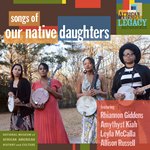

Rhiannon Giddens, Amythyst Kiah, Leyla McCalla, and Allison Russell explore new touchstones in the story of American Racism.

Songs of Our Native Daughters gathers together kindred musicians Rhiannon Giddens, Amythyst Kiah, Leyla McCalla, and Allison Russell in song and sisterhood to communicate with their forebears. Drawing on and reclaiming early minstrelsy and banjo music, these musicians reclaim, recast, and spotlight the often unheard and untold history of their ancestors, whose stories remain vital and alive today. Co-produced by Giddens and Dirk Powell (Balfa Toujours, Joan Baez), the collection portrays the often overlooked suffering, resilience, and agency of black women in the face of intersectional oppression throughout American history.
The material on Songs of Our Native Daughters -- written and sung in various combinations -- is inspired by New World slave narratives, discrimination and how it has shaped our American experience, as well as musicians such as Haitian troubadour Althiery Dorval and Mississippi Hill Country string player Sid Hemphill, and more.
Giddens first conceived of the idea for 'Songs of Our Native Daughters' while reading historical accounts of slavery in the Smithsonian National Museum of African American History and Culture. The idea was further encouraged by her observations of a more contemporary slave narrative, specifically a rape scene in the 2016 film Birth of a Nation. Following the encounter between an enslaved woman and a plantation owner’s friend, the camera shows, not the woman’s reaction, but rather the face of the “wronged” husband, who is motivated by the rape of his wife to join a slave rebellion.
“As I sat in the little theater in New York City, I found myself furious,” Gidden’s explains in the album’s liner notes, “Furious at this moment in a long history of moments of the pain and suffering of black women being used to justify a man’s actions; at her own emotion and reaction being literally written out of the frame.”
Photo Credits:
(1)-(2) Smithsonian Folkways,
(3) Rhiannon Giddens,
(4) Amythyst Kiah,
(5) Allison Russell,
(unknown/website);
(6) Leyla McCalla
(by Walkin' Tom).